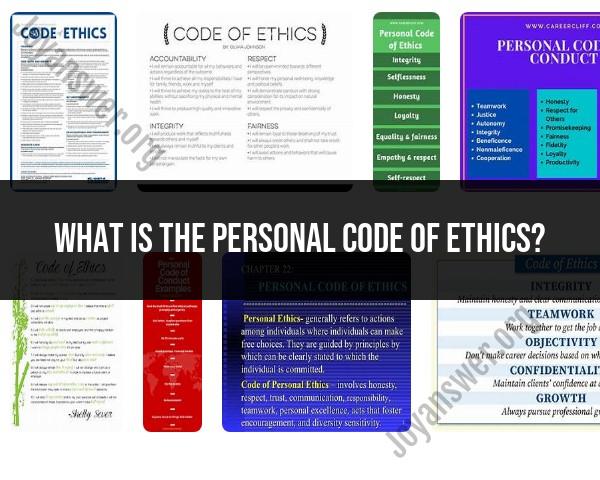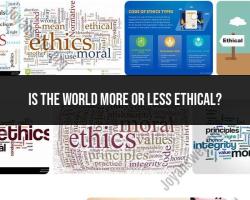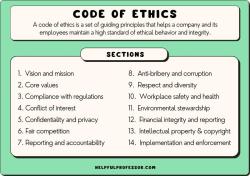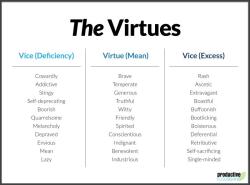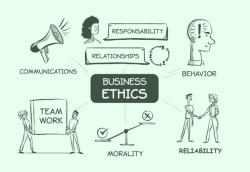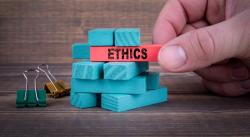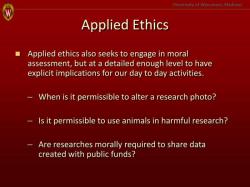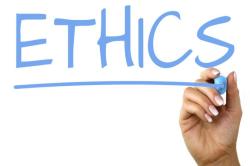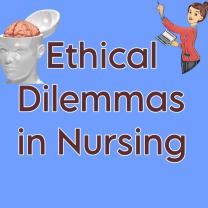What is the personal code of ethics?
A personal code of ethics is a set of principles and moral guidelines that an individual develops to guide their own behavior and decision-making. It is a reflection of one's values, beliefs, and ideals, serving as a framework for ethical conduct in various aspects of life. A personal code of ethics is a deeply individual and subjective document that outlines the ethical standards and principles that a person strives to uphold.
Key elements of a personal code of ethics include:
Core Values:
- Identification of the fundamental values that are most important to the individual. These values form the foundation of the code of ethics.
Ethical Principles:
- Articulation of the guiding principles and moral standards that will govern the individual's behavior. This may include principles such as honesty, integrity, fairness, and compassion.
Behavioral Guidelines:
- Specific guidelines on how to translate ethical principles into actions. These guidelines provide direction on how to behave in different situations, both personally and professionally.
Decision-Making Criteria:
- Criteria for ethical decision-making. This includes factors to consider, questions to ask, and processes to follow when faced with moral dilemmas.
Responsibilities and Obligations:
- Identification of personal responsibilities and obligations to oneself, to others, and to the community. This may encompass commitments to family, friends, colleagues, and society at large.
Professional Standards (if applicable):
- For individuals in professional settings, a personal code of ethics may include specific standards related to their field or industry.
Continuous Improvement:
- Recognition that ethical considerations are dynamic, and the code of ethics may need to evolve over time. A commitment to ongoing self-reflection and refinement of ethical principles.
Accountability:
- Acknowledgment of personal accountability for one's actions and decisions. This involves taking responsibility for the consequences of one's behavior.
Balancing Conflicting Values:
- Consideration of how to navigate situations where different values may come into conflict. This involves establishing priorities and finding a balance when faced with competing ethical considerations.
Social and Environmental Considerations:
- Recognition of the broader impact of personal actions on society and the environment. This may involve a commitment to social responsibility and environmental stewardship.
Creating a personal code of ethics is a reflective process that requires individuals to think deeply about their values and the ethical principles that matter most to them. It serves as a guide for making decisions aligned with one's moral compass and contributes to personal growth and development. While personal codes of ethics are highly individualized, they often share common themes related to integrity, empathy, and a commitment to ethical behavior.
Personal Code of Ethics: A Compass for Life
1. Defining a Personal Code of Ethics:
A personal code of ethics is a set of core values and principles that guide an individual's actions and decisions. It acts as a personal compass, informing their choices and helping them navigate through complex situations in life.
This code can encompass:
- Fundamental Values: Beliefs and principles that hold the highest importance for the individual, such as honesty, integrity, compassion, justice, and respect.
- Moral Guidelines: Specific rules or standards that translate those values into practical application in various situations.
- Personal Commitments: Pledges to specific actions or behaviors that reflect the individual's commitment to their ethical framework.
2. Development and Definition:
Developing and defining a personal code of ethics is a continuous process:
- Self-Reflection: Individuals engage in introspection to identify their core values, beliefs, and priorities.
- Exposure to Ethical Systems: Studying different ethical philosophies and frameworks can provide a broader perspective and inform individual values.
- Experience and Learning: Life experiences, both positive and negative, contribute to shaping and refining personal ethical principles.
- Role Models and Mentors: Observing and learning from individuals with strong ethical character can guide the development of a personal code.
- Dialogue and Discussion: Engaging in conversations with others about ethical issues can help clarify and refine individual principles.
3. Influence on Decision-Making and Behavior:
A strong personal code of ethics has a profound influence on decision-making and behavior in the following ways:
- Provides a Moral Anchor: Offers a clear framework for evaluating options and making choices that align with personal values.
- Promotes Consistency: Encourages individuals to act with integrity and maintain consistency between their stated values and behaviors.
- Enhances Moral Courage: Provides the strength and conviction to stand up for what is right, even when it is difficult or unpopular.
- Empowers Ethical Action: Enables individuals to act ethically even when facing external pressures or temptations to do otherwise.
- Builds Trust and Credibility: Demonstrating ethical conduct fosters trust and respect from others, enhancing relationships and reputation.
Developing and adhering to a personal code of ethics is a lifelong journey of self-discovery and moral growth. It empowers individuals to make informed decisions, live with integrity, and contribute positively to society.
